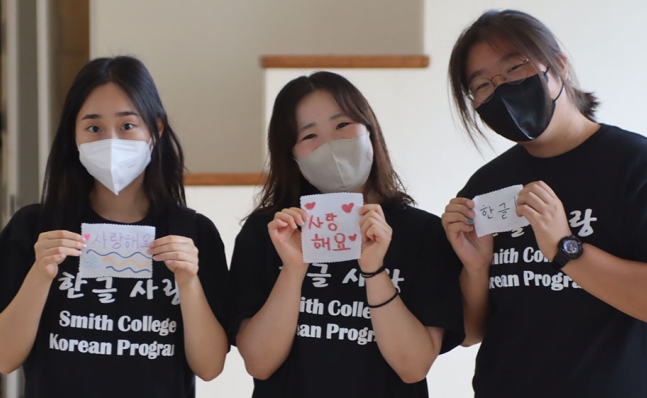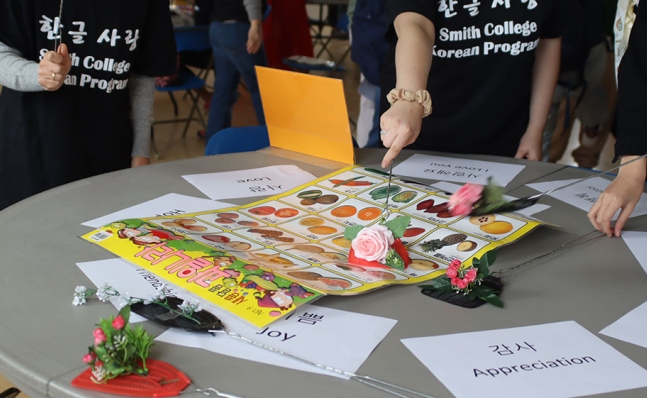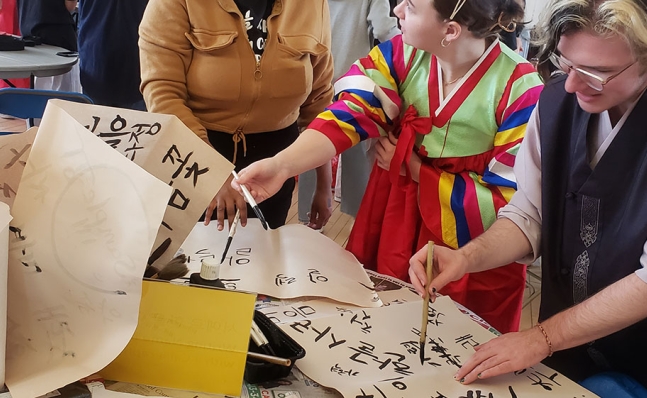The Department of East Asian Languages and Cultures offers multiple pathways for students to develop their knowledge of the vibrant cultures of China, Japan and Korea. While developing linguistic and cultural fluency through our language, literature and culture courses, students will engage with a diverse array of genres from traditional poetry to popular fiction and will explore issues such as translation, identity and gender within traditional and modern contexts. Students can choose to further expand their knowledge of East Asia through courses in anthropology, art history, economics, government, history, music, religion and world literatures.
Within the major, students can choose tracks in either Chinese, Japanese or East Asian studies and take a combination of language, literature, culture or other classes in the humanities and social sciences. The minor allows for concentrations in Chinese, Japanese, Korean or East Asian studies. We also encourage students to take advantage of our outstanding study abroad programs, where they accelerate their language studies and learn firsthand about contemporary Chinese, Japanese or Korean society and culture.
Announcements
Have A Question? Ask Our Student Liaisons!
2023-24 Liaisons:
Mia Pego mpego@smith.edu, Chinese
Sophie Weaver, sweaver@smith.edu, Japanese
Jingyi Sze jsze@smith.edu, Korean
Meet the Major Senior News: Roy Yan '22
Meet the Major! Roy Yan '22
The Botanic Garden tour app is now live
https://garden.smith.edu/visit/botanic-garden-app
“A Lyrical Walk: The Meaning of Plants in Traditional Chinese Poetry” This lyrical walk provides visitors an aesthetic experience through Chinese poetry while they enjoy the Smith campus and appreciate the surrounding flora and fauna. This cumulative project is derived from the final project in The Culture of the Lyric in Traditional China course, taught by Professor Sujane Wu in Fall 2020.
Students will:
- Explore and analyze texts, arguments and social phenomena relating to East Asia.
- Integrate general and specialized knowledge with appropriate disciplinary frameworks to ask productive questions and solve problems in their study of China, Japan or Korea.
- Design and carry out an independent, thesis-driven research project (the seminar).
- Develop an understanding of East Asian language, literature and culture—modern and premodern—that will give them historical and comparative perspectives on the world that go beyond simple East-West binaries.
- Engage with the international community at Smith and abroad, learning to communicate respect and understanding across cultures, preparing for—and beginning—lives of ongoing influence in today’s global world.
- Majors and minors in the Chinese, Japanese and Korean tracks will learn to use Chinese, Japanese or Korean to navigate a variety of social and professional situations appropriately and confidently, and to have nuanced discussions about social and cultural issues, as well as professional and academic topics that are of interest to them. They will gain a deep understanding of and fluency in one language and culture.
- Majors and minors in the East Asian studies track will achieve at least intermediate proficiency in Chinese, Japanese or Korean, including listening, speaking, reading and writing. They will develop a multidimensional, interdisciplinary understanding of the arts, beliefs, societies and traditions of either one East Asian country or of a specific theme across East Asia as a region.
Track 1: Chinese
Prerequisites: The first year of Chinese (CHI 110 and 111) is a prerequisite for admission to the major. A language placement test is required prior to registration for students who have previously studied the language.
Advisers: Yalin Chen, Jessica Moyer, Sujane Wu
Requirements: Students take a total of 11 courses (46 credits), distributed as follows:
- Second-year language courses (10 credits): CHI 220 and 221 (two courses). Students who place into the third year or above will have this credit requirement waived (that is, such students need only nine courses or 36 credits for the major).
- Third-year language courses (8 credits): CHI 301 and 302 (two courses). In consultation with their adviser, a student whose proficiency places them beyond the third year must substitute advanced language or literature courses for this requirement.
- At least three EAL-prefix courses (12 credits) in Chinese literature or culture, including a departmental seminar. Students concentrating on China are strongly encouraged to take EAL 231, 232, and/or 234 early, and they must take at least one of these three courses.
- At least one EAL-prefix course (4 credits) focusing principally on the literature of another East Asian country.
- Three additional courses (12 credits), which may be chosen from other advanced language or literature courses in the department or, at the recommendation of the adviser, from related courses in other departments.
Of the 11 required courses, no more than five shall normally be taken in other institutions, such as through the Five Colleges, study abroad programs or summer programs. Students should consult their advisers prior to taking such courses. S/U grading options are not allowed for courses counting toward the major.
Students with native or near-native fluency in Chinese (those with competence above the fourth-year level) need 11 courses for the major, replacing required language courses either with study of a second East Asian language at or above the intermediate level, or with additional courses in Chinese literature and culture. Such students should consult early with an adviser to determine the most appropriate pathway through the major.
Track 2: Japanese
Prerequisites: The first year of Japanese (JPN 110 and 111) is a prerequisite for admission to the major. A language placement test is required prior to registration for students who have previously studied the language.
Advisers: Kimberly Kono, Yuri Kumagai, Atsuko Takahashi
Requirements: Students are expected to concentrate in Japan and take a total of 11 courses (46 credits), distributed as follows:
- Second-year language courses (10 credits): JPN 220 and 221 (two courses). Students who place into the third year or above will have this credit requirement waived (that is, such students need only nine courses or 36 credits for the major).
- Third-year language courses (8 credits): JPN 301 and 302 (two courses). In consultation with their adviser, a student whose proficiency places them beyond the third year must substitute advanced language or literature courses for this requirement.
- At least three EAL-prefix courses (12 credits) in Japanese literature or culture, including a departmental seminar. Students concentrating on Japan are strongly encouraged to take both EAL 241 and 242, but they must take at least one of the two.
- At least one EAL-prefix course (4 credits) focusing principally on the literature of another East Asian country.
- Three additional courses (12 credits), which may be chosen from other advanced language or literature courses in the department or, at the recommendation of the adviser, from related courses in other departments.
Of the 11 required courses, no more than five shall normally be taken in other institutions, such as through the Five Colleges, study abroad programs or summer programs. Students should consult their advisers prior to taking such courses. S/U grading options are not allowed for courses counting toward the major.
Students with native or near-native fluency in Japanese (those with competence above the fourth-year level) need 11 courses for the major, replacing required language courses either with study of a second East Asian language at or above the intermediate level, or with additional courses in Japanese literature and culture. Such students should consult early with an adviser to determine the most appropriate pathway through the major.
Track 3: East Asian Studies
Please see the EAS Major Advising Worksheet.
Advisers: Marnie Anderson, Ernest Benz, Kimberly Kono, Suzanne Gottschang, Jessica Moyer, Irhe Sohn, Sujane Wu
The major track in East Asian studies reflects the emergence of East Asia politically, economically and culturally onto the world scene, especially during the last century, and anticipates the continued importance of the region in the future. It also offers students an opportunity to develop a coherent and comprehensive understanding of the great civilizations of the Asia Pacific region.
The major track in East Asian studies combines language study with courses in anthropology, art, economics, government, history and religion. Majors graduate from the program with a firm grasp on the culture and history of the region, as well as a command of at least one language. Thus, the program prepares students for post-graduate endeavors ranging from graduate school to careers in the public and private sectors dealing with East Asia.
Requirements:
I. Basis Courses
An East Asian language: The second year of an East Asian language, which can be fulfilled by CHI 220 and 221, JPN 220 and 221, or KOR 201 and 202, or any higher-level courses. Extensive language study is encouraged, but only two courses at the second-year level or higher will count toward the major. Normally, language courses will be taken at Smith or within the Five Colleges. Students with native or near-native fluency in an East Asian language must take a second East Asian language. Native and near-native fluency is defined as competence in the language above the fourth-year level.
II. Survey Courses
- One survey course on the premodern civilization of an East Asian country: HST 211, HST 212, HST 220, HST 221, HST 222, HST 223, EAL 231, EAL 233, EAL 234, EAL 235, EAL 241, ARH 200, ARH 352.
- HST 200 (formerly EAS 100) Modern East Asia (normally by the second year).
III. Electives
Six elective courses, which shall normally be determined in consultation with the adviser from the list of approved courses.
- Four of the elective courses shall constitute an area of concentration, which can be an emphasis on the civilization of one country (China, Japan or Korea) or a thematic concentration (comparative modernization, religious traditions, women and gender, political economy, thought and art). Other concentrations may be formulated in consultation with an adviser.
- Electives must include courses in both the humanities and the social sciences.
- Electives must include courses on more than one East Asian country.
- One of the elective courses must be a Smith seminar on East Asia.
- One elective may be a non-seminar course, approved by the adviser, offering a broader comparative framework for East Asian studies.
- At least half of the course credits toward the major must be taken at Smith.
- No more than two 100-level courses shall count as electives.
- No course taken for a satisfactory/unsatisfactory grade counts toward the major.
- Normally students with a second major may count a maximum of three (3) courses from the department of that other major toward the EAS major.
Additional Approved Courses in the Humanities (in addition to EALC courses) for the East Asian Studies Track
ARH 200 China in Expansion
ARH 280 Art Historical Studies
Manga in A Thousand Years: Critical Approaches to Manga and Anime
Playing with Ink and Brush (900 CE to Present): A Material, Cultural and Political History of East Asian Art
Meditation In Caves: Buddhist Grottoes in East Asia
ARH 352 Studies in Art History
Naturalism & Amateurism: The Aesthetics of the Song Dynasty (960-1276) Paintings
BUS 240 Buddhism and Gender
DAN 142 Dance Forms I
Korean Traditional Dance
FYS 150 Writing and Power in China
MUS 220 Topics in World Music
The Music of Japan
PHI 112 Chinese Philosophy
REL 110 Colloquia: Thematic Studies in Religion
Politics of Enlightenment
REL 161 Introduction to Buddhist Thought
REL 264 Buddhist Meditation
REL 270 Zen Buddhism and Japanese Culture
REL 360 Seminar: Problems in Buddhist Thought
Enlightenment
WLT 232 Modern Chinese Literature
WLT 239 Intimacy in Contemporary Chinese Women's Fiction
WLT 270 Health and Illness: Literary Explorations
Additional Approved Courses in the Social Sciences for the East Asian Studies Track
ANT 223 In Sickness and in Health: Biopolitics, Public Health, and Medicine in East Asia
ANT 252 The City and the Countryside in China
ANT 253 Introduction to East Asian Societies and Cultures
ANT 342 Seminar: Topics in Anthropology
Biopower, Biopolitics, and Governance
ECO 219 The Chinese Economy
ENV 230 Colloquium: Environment and Society in Contemporary China
FYS 183 Images of Japanese Women
GOV 228 Government and Politics of Japan
GOV 230 Chinese Politics
GOV 235 Government and Politics in East Asia
GOV 251 Foreign Policy of Japan
GOV 253 Colloquium: Culture and Diplomacy in Asia
GOV 327 East Asian Politics Seminar
GOV 328 Rising China
GOV 329 Comparative Politics of Northeast Asia
GOV 340 Seminar: Taiwan--Internal Politics and Cross-Strait Relations
GOV 348 Seminar in International Politics
Conflict and Cooperation in Asia
HST 200 (L) Modern East Asia
HST 211 (L) The Emergence of China
HST 212 (L) China in Transformation, A.D. 750–1900
HST 213 History of Modern China
HST 214 (C) Aspects of Chinese History
The World of Thought in China
HST 217(L) World War Two in East Asia: History and Memory
HST 220(C) Japan to 1600
HST 221 (L) Samurai to Sony: The Rise of Modern Japan
HST 222(C) Aspects of Japanese History
The Place of Protest in Early Modern and Modern Japan
HST 223 (C) Women and Gender in Japanese History
Women in Japanese History From Ancient Times to the 19th Century
HST 301 Calderwood Seminar on Public Writing
Writing about Twentieth-Century Wars in Asia
HST 313 Seminar: Problems in East Asian History
Remembering the Asia-Pacific War
Writing Gender Histories of East Asia
Course requirements are designed so that a student concentrates on one of the East Asian languages but has the option of being exposed to the other courses in the department.
Track 1: Chinese
Advisers: Yalin Chen, Jessica Moyer, Sujane Wu
Prerequisites: The first year of Chinese (CHI 110 and 111) is a prerequisite for admission to the minor.
Requirements: A total of six courses in the following distribution, no more than three of which shall be taken in other institutions. Students should consult the department prior to taking courses in other institutions. The S/U grading option is allowed for only one course counting toward the minor.
- Chinese II (CHI 220 and 221) (10 credits).
- Four courses, at least two of which must be EAL-prefix courses in Chinese literature and culture.
Track 2: Japanese
Advisers: Kimberly Kono, Yuri Kumagai, Atsuko Takahashi
Prerequisites: A total of six courses in the following distribution, no more than three of which shall be taken in other institutions. Students should consult the department prior to taking courses in other institutions. The S/U grading option is allowed for only one course counting toward the minor.
- Japanese II (JPN 220 and 221) (10 credits).
- Four courses, at least two of which must be EAL-prefix courses in Japanese literature and culture.
Track 3: Korean
Advisers: Suk Massey, Irhe Sohn
Prerequisites: The first year of Korean (KOR 101 and 102) is a prerequisite for admission to the minor.
Requirements: A total of six courses in the following distribution, no more than three of which shall be taken in other institutions. Students should consult the department prior to taking courses in other institutions. The S/U grading option is allowed for only one course counting toward the minor.
- Korean II (KOR 201 and 202) (8 credits).
- Four courses, at least two of which must be EAL-prefix courses in Korean literature and culture.
Track 4: East Asian Studies
The minor in East Asian studies provides a coherent understanding of and basic competence in the civilizations and societies of China, Japan and Korea. It may be undertaken to broaden the scope of any major; to acquire, for comparative purposes, an Asian perspective within any of the humanistic and social-scientific disciplines; or as the basis of future graduate work or careers related to East Asia.
Advisers: Marnie Anderson, Ernest Benz, Kimberly Kono, Suzanne Gottschang, Jessica Moyer, Irhe Sohn, Sujane Wu
Requirements: The minor consists of a total of six courses, no more than three of which shall be taken at other institutions. Courses taken away from Smith require the approval of the East Asian Studies adviser.
- HST 200 (formerly EAS 100) Modern East Asia (normally by the second year).
- Five elective courses, which shall be determined in consultation with the adviser.
- One year of an East Asian language is strongly encouraged and may constitute two elective courses. (One semester of a language may not be counted as an elective.)
- No course taken for a satisfactory/unsatisfactory grade counts toward the minor.
Special Studies
Before the semester begins, students should consult with their EALC major or minor adviser, and the instructor with whom they would like to do the special studies. After consulting with their adviser and instructor, students must apply for departmental approval from the EALC curriculum committee and chair. Specifically, the student should submit a 1-2 paragraph description of the special studies, along with a schedule of readings and assignments. Once the student receives approval from the EALC curriculum committee and chair, the student will submit an application for special studies to the Registrar's office. Students who wish to count a special studies in another department toward their EAS track major or minor must get approval from the instructor, the department of that special studies, and their major or minor adviser.
Honors
Students who wish to pursue an Honors Thesis should meet with a faculty member in the department to discuss ideas and develop a proposal with the assistance of the potential thesis supervisor during the spring semester of their junior year.
Students should also consult with the Honors Director of the department no later than the spring semester of their junior year.
Director: Irhe Sohn
EAL 430D Honors Project
Credits: 4-8
Normally offered each fall
EAL 431 Honors Project
Credits: 8
Normally offered each fall. Please consult the director of honors for specific requirements and application procedures.
Check the Course Search Tab and Smith College Course Catalog for current offerings, times and locations.
Check the Course Search Tab and Smith College Course Catalog for current offerings, times and locations.
Featured Events
There are no events scheduled at this time.
Other East Asianists on Campus
Marnie S. Anderson
Professor of History; Chair of EALC 2022-24
Ernest Benz
Associate Professor of History
Suzanne Gottschang
Professor of Anthropology
Yanlong Guo
Assistant Professor of Art
Jamie Hubbard
Professor of Religion & Yehan Numata Professor in Buddhist Studies; Jill Ker Conway Chair in Religion & East Asian Studies
Sabina Knight
Professor of Chinese and of Comparative Literature, Program in World Literatures
Maggie Y. Liu
Assistant Professor of Economics
Sara Newland
Assistant Professor of Government
Margaret Sarkissian
Professor of Music
Research Affiliate
Ling Zhao
Research Affiliate in Chinese
Emeriti Faculty
Daniel K. Gardner
Dwight W. Morrow Professor of History Emeritus
Maki Hubbard
Professor Emerita of Japanese Language & Literature
Thomas Rohlich
Professor Emeritus of Japanese Language & Literature
Esther Cloudman Dunn Professor Emeritus of Government
Class Projects
Chinese Class Projects
View a playlist of three recent Chinese class projects: Chinese Character Literacy project, Chinese Podcast Project, and Chinese Food Project
Opportunities & Resources
The Department of East Asian Languages and Cultures awards two yearly prizes.
Ettie Chin Hong ’36 Prize
The Ettie Chin Hong ’36 prize awarded to a senior majoring in East Asian Languages and Cultures who has demonstrated leadership and academic achievement and who intends to pursue a career in education or service to immigrant and needy communities.
Mary Maples Dunn Prize
The Mary Maples Dunn Prize is awarded annually for an essay written in English (normally 4-8 pages) within the current or three preceding semesters in a regular course in the Department of East Asian Languages and Cultures, including approved cross-listed courses for the EAS track. Essays originally submitted in seminars, for special studies or as honors theses are not eligible. If an essay was written in response to a specific question or problem posed by an instructor, the stated assignment should be submitted along with the essay. All essays should indicate for which course and in which semester they were originally written. Students may submit only one essay for the competition per year. Students who have not competed in the past for this prize are strongly encouraged to apply. Essays should be submitted via email as a clearly marked pdf document to Kathleen Gauger, kgauger@smith.edu by (2024 deadline TBA) and clearly identified as a submission for the Mary Maples Dunn Prize. English language submissions only.
Overview
There are a number of Smith-approved programs in Asia. Learn more about study abroad on the Office for International Study website. Be sure to consult with your major adviser as you make your study abroad plans.
Advisers: Jessica D. Moyer (Chinese); Kimberly Kono (Japanese); Suk Massey (Korean)
Junior Year Abroad programs are encouraged at approved institutions in East Asia; we recommend the Associated Kyoto Program (AKP) for Japan; Middlebury, and CET for China and Taiwan; and Ewha Women’s University for Korea. Students planning on studying abroad should consult the department concerning the list of courses to be credited toward the major or minor and must seek final approval for the courses upon their return.
Requirements
Courses taken abroad, as well as courses taken away from Smith at other domestic institutions, may count toward the major or minor under the following conditions:
- For major, no more than five courses and for minor, no more than three courses shall normally be taken in other institutions, such as through the Five Colleges, study abroad programs or summer programs. Students should consult their advisers prior to taking such courses.
- The courses are reviewed and approved by the advisers and curriculum committee upon completion.
China
Immersion language programs in Beijing, China. Click on the link above for more information.
Japan
Smith Consortium Program
Smith in Japan: Associated Kyoto Program
Term: Year
Location: Kyoto
Language of Instruction: Japanese, English
Prerequisites: One year of Japanese and one Japan-related course other than language.
Program Highlights: AKP emphasizes Japanese language acquisition, and elective courses include Japanese history, culture, literature, politics and economics taught in English by consortium faculty. AKP is based at Doshisha University, and students live with host families. Students may join Doshisha student clubs and circles or study traditional arts with local teachers and artists through AKP's network in Kyoto.
Smith Representative: Kimberly Kono
Korea
Summer Program at Ewha Woman's University (Seoul)
Each year, Smith College selects six students to attend Ewha International Summer School tuition free. Applicants with a strong interest in studying the Korean language and culture, one year of Korean study and a 3.0 GPA are preferred. Korean nationals are not generally eligible. Students may also apply for International Experience Grants for financial assistance. Students who are selected by Smith are responsible for applying directly to Ewha International Summer School for admission and for obtaining the proper visa.
Smith Representative: Suk Massey
Taiwan
CET Taiwan Study Abroad Program
CET Intensive Language Program in Taipei, Taiwan. Click on the link above to apply.
Consortium for Study Abroad In Taiwan (Fulbright Taiwan)
CSAT is a pilot program launched by Fulbright Taiwan that aims to encourage American students to study abroad in Taiwan.
Internal Smith College Grants
Intensive Summer Language Study Grant
The application form for this program is available on the class deans website.
Mary Maples Dunn Fund Grants for Summer Language Study or Research
Mary Maples Dunn Fund Grants for Summer Language Study or Research—A limited number of small grants (up to $1,000) are available to students who are planning to study an East Asian Language (Chinese, Japanese or Korean) or conduct summer research in East Asia. Applications should include a personal statement about how the summer plan fits into the student’s academic program plus a transcript. Priority will be given to EALC majors and minors and to students who have not received previous funding. Our goal is to support students who have a demonstrated commitment to long-term language study using East Asian languages. Note that the stipend may not be used for the Ewha Exchange Program. Successful awardees are expected to continue their language study upon their return to Smith in the fall. Details are announced every March or April via e-Digest.
External Grants & Scholarships
Hong Kong Fellowship Scheme
The Research Grants Council of Hong Kong offers the Hong Kong Ph.D. Fellowship Scheme. This program aims to attract top international students to pursue doctoral studies in Hong Kong’s world-class research universities. The fellowship provides a monthly stipend and a conference and research-related travel allowance per year for a period of three years. For further information, contact HKPF@ugc.edu.hk.
Blakemore Fellowship
The Blakemore Foundation was established in 1990 by Thomas and Frances Blakemore to encourage the advanced study of Asian languages and to improve the understanding of Asian fine arts in the United States. Since 1990, the foundation, with the support of The Freeman Foundation, has awarded over $17 million in grants to college graduates and young professionals for an academic year abroad in full-time intensive language study. The fellowships cover tuition and a stipend for related educational expenses, basic living costs and transportation. See https://blakemorefoundation.communityforce.com for details on the Blakemore Freeman Fellowships for an academic year of advanced language study in East and Southeast Asia.
Ministry of Education (MOE) Taiwan Scholarships
The Ministry of Education (MOE) has established two scholarship programs: Taiwan Scholarship Program (TSP) and Huayu Enrichment Scholarship (HES). The TSP provides those who seek bachelor, master and doctoral degree programs in Taiwan with grants that include tuition, fees and a monthly stipend. The HES program is designed for students to learn the Mandarin language in Taiwan. The award period may be 3, 6, 9 or 12 months from September 2023 to August 2024. The scholarship provides a monthly stipend of NT $25,000, which equals US $810 approximately. Deadline for both programs is March 31, 2023. For details and application materials, please visit the MOE website.
Critical Language Scholarships
A program of the U.S. Department of State’s Bureau of Educational and Cultural Affairs, the Critical Language Scholarship (CLS) Program is an intensive overseas language and cultural immersion program for American students enrolled at U.S. colleges and universities. The program includes intensive language instruction and structured cultural enrichment experiences designed to promote rapid language gains. The application and further information can be found on the Critical Language Scholarship website.
Asian Studies Grants & Fellowships
The Association for Asian Studies offers a listing of grants and fellowships.
Boren Scholarships and Fellowships
Boren Awards provide funding opportunities for U.S. undergraduate and graduate students to study in Africa, Asia, Central and Eastern Europe, Eurasia, Latin America and the Middle East, where they can add international and language components to their education. Boren scholars and fellows represent a variety of academic backgrounds but all are interested in studying less commonly taught languages, including, but not limited to, Arabic, Chinese, Korean, Portuguese, Russian and Swahili.
Study Abroad in Japan
The United States-Japan Bridging Foundation offers scholarships to American undergraduate students participating in study abroad programs in Japan. Scholarships assist students with the travel and living expenses they will incur while studying abroad in Japan for a semester or an academic year. Applications are accepted twice a year.
LeadNext: Ambassadors for a Global Future (apply by November 15, 2021)
Asia Foundation Call for Applications for the new virtual program (with an in-person summit) that will run from January-August 2022. The program requires only occasional virtual commitments and a one-week summit in August in San Francisco. Further details here, including clarification of eligibility and application routes (different for U.S. applicants and international students from Asia).
Five College Resources
- Five College East Asian Language Program
- Five College Center for East Asian Studies
- Amherst College, Department of Asian Languages & Civilizations
- Hampshire College, Asian Studies
- Mount Holyoke College, Asian Studies Program
- Smith College Libraries: East Asian Studies
- University of Massachusetts, East Asian Languages & Literatures
Online Libraries
AsiaNetwork
A consortium of North American colleges, AsiaNetwork strives to strengthen the role of Asian studies within the framework of liberal arts education to help prepare succeeding generations of undergraduates for a world in which Asian societies play prominent roles in an ever more interdependent world. The organization publishes AsiaNetwork Exchange, a peer-reviewed journal for Asian studies in the liberal arts.
Publications
The Wittenberg University East Asian Studies Journal is completely written, edited and published by undergraduate students.
Call for Papers
The Undergraduate Journal of Humanistic Studies is a peer-reviewed academic journal that promotes undergraduate research in the humanities and social sciences. See submission information.
Contact
Administrative Assistant: Kathleen Gauger
Office hours are Monday–Friday,
8:30 a.m.–4:30 p.m. Lunch 12–1 p.m.
Department Chair: Marnie Anderson
Individual appointments may be arranged directly with the faculty.





















